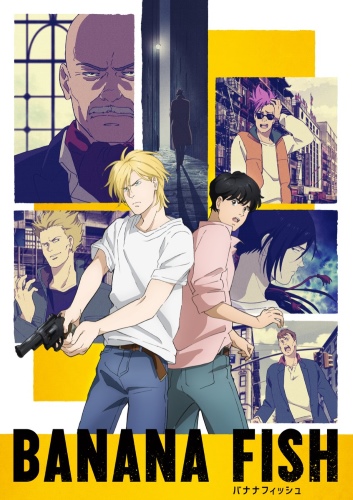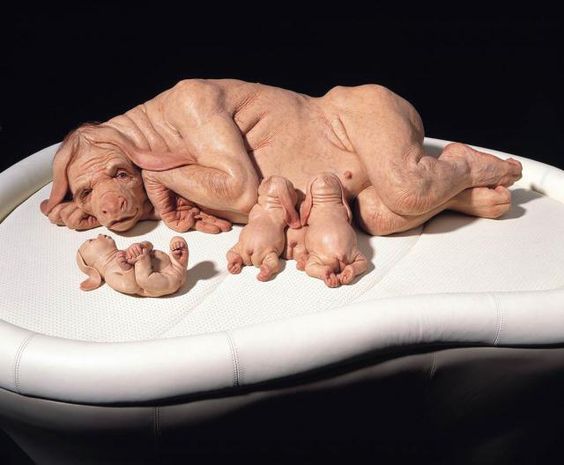Watching (and reading): Banana Fish
Content warning: discussions of rape and CSA. Also spoilers about the series and how it ends. If you don't care about spoilers, give it a read.
Where to begin, really? I finally finished my watch through of Banana Fish, a series I'd started on some years prior but hadn't watched in its entirety until recently. I'd also read through a good portion of the manga and it's interesting to note that the anime is fairly faithful in its adaptation- just updating the setting to the contemporary and swapping the Vietnam war for the gulf war in the backstory.
At its heart, Banana Fish is a tragic romance between two teen boys from vastly different worlds- Ash Lynx, a former child prostitute turned gang leader who'd been groomed by a mafia don to be a successor, and Eiji Okumura, a gentle Japanese boy accompanying a journalist as an assistant. They meet on a story focused on Ash's gang and their lives get turned upside down as Ash is caught up in a deadly conspiracy. He'd witnessed a man's death and had been given a mysterious capsule and an address by the dying man, and in doing so Ash ends up discovering what caused his older brother to go crazy in Iraq and return home in a practically vegetative state. The mafia and key players in the US government are willing to do anything to stop Ash from uncovering their scheme.
Banana Fish is a codeword for a highly hallucinogenic drug that causes a person to both become violent and highly suggestible, a perfect tool for political assassination. It is first tested in Iraq (or in the comics, in Vietnam) on American soldiers and the drug is then used by the mafia as a powerful means to worm its way into the US government. Don Golzine is also the head of a child prostitution ring and has blackmail on several high profile people in the US government. Frankly the manga was pretty ahead of its time with a story on an Epstein-alike taken to its logical conclusion. I very largely hate conspiracy stories when they have no basis in reality or imagine some force beyond corruption or a crime syndicate pulling strings, so it's refreshing to take in a story where the conspiracy is less "illuminati" and more grounded in the real life atrocities that we know happened- including the fact that mind control drugs have been experimented with albeit unsuccessfully. This anime also addresses the fact that prison populations have been used (and are still used) for medical experimentation.
Let's be real, illuminati type shit devolves into bizarre anti-semitism and xenophobia. I was chatting with a friend about the very bad writing of the game Deus Ex and it all plays out exactly like something an unhinged podcaster would be trying to state as fact. Banana Fish very thankfully avoids all of that.
One thing I really liked about Banana Fish, for all its grimness and grittiness, is how it pretty sensitively handles the topic of rape and Ash's extensive history as a victim of child sexual abuse. Although the discussions of the topic and some of the character's actions don't candycoat anything, we're never shown anything that feels exploitative or graphic. Ash has a voice and people around him that understand the gravity of what he's been through. It's rare to see something like that addressed in a way that's so frank and nuanced. Ash is very much an action hero in the series- impeccable sharpshooting, cat-like reflexes, never lets his guard down- but he's also incredibly vulnerable and traumatized too. His relationship with Eiji is something both healing and threatening to shatter his composure. The nature of their relationship is interesting too, in that it is deeply and strongly a romantic attraction, but there is no sexual aspect to it- which makes a lot of sense to me on the level that Ash primarily associates sex with the abuse he's suffered. Eiji is special because he demands nothing of Ash. The only kiss they share onscreen is something strategic (Ash is passing a capsule with a note to Eiji in a covert fashion). But they hug and share a lot of relaxed domestic intimacy together. It's all pretty heart-wrenching stuff. When Ash is with Eiji, he gets to just be a 17 year old boy again.
Banana Fish is a romance but it's also about cycles of violence and how the hyperviolent world its characters live in is hard to escape. It pulls them back in and not everyone gets out alive, and this is especially true from the impoverished teen gangs. We see this first with Skipper, a young boy in Ash's gang who dies tragically at the hands of the mafia. And then we see this with Ash's friend and leader of a Chinese gang Shorter Wong, who is dosed with the Banana Fish drug and forced to kill his friends. Ash has to shoot him to save Eiji's life. Ash ultimately can't escape this fate himself and dies in the last episode because he lets his guard down reading a letter from Eiji.The author's intent was always to have a story about the tragedy of a young life ending, but man it's heavy.
The choice to kill Ash in the story is something I both agree with and don't agree with. Narratively, it makes sense and ties in perfectly with themes established in the series. On the other hand, in a story where all the worst bastards meet their maker and the more complicated characters get a second chance to be better you feel a little cheated. Yut-Lung, who is both villain and victim in the story gets a chance to be better than the abusive crime family he was born into. Blanca, an assassin for hire and Ash's former mentor, gets to right some wrongs and choose to not just be a pawn in others' games. While I'm sure their lives could still end in tragedy they get the benefit of an open-ended future. Life of course isn't fair and fairness has little to do with good storytelling. But damn if I don't want to see Ash have a chance. You watch Ash defy death and endure incredible pain over and over again and really you want some relief as a viewer (even though for Ash death is a relief and a sacrifice he views as a means of keeping Eiji safe from the violence of his world).
There were a few elements to the story that didn't work for me on a functional level- ie: Ash being in conflict with Chinese gang members because he had to essentially mercy kill Shorter and wouldn't explain why. That was weakly explained with wanting to keep others safe from the knowledge about the conspiracy, but that just didn't matter when everyone got caught up in the fight against the mafia anyway. I hate conflict that arises from a situation where characters could easily talk but don't. Ultimately this conflict is why Ash dies in the ending too.
I'm not going into detail about all the moving parts in the story that I did like, or all the characters I enjoyed seeing. Max Lobo, Jessica, Cain Blood, Yut-Lee, Blanca, Sing, and Shorter are all interesting characters that were a lot of fun to watch. Max and Ash have a very touching arc together, where they begin as reluctant allies, to somewhat enemies, to friends, to father and son. Max and Ash pretend to be father and son as part of a scheme and it becomes very real for Max especially.
It's a heart breaking series and I highly recommend it. It delivers on both dynamic action and lots of wit and character. It's tender and tragic. The anime deals with its racially diverse cast pretty well, though in the manga there's some issues (and it should be noted that the English translation might have slurs that the original Japanese text did not use at all), so just keep that in mind if you want to dive into the manga. The manga does have the benefit of getting into finer details with all its different characters, which you get less of in the fairly concise 24 episode adaptation of the anime. I also think the manga has a neat art style and you lose a bit of that in translation to the anime.
I'm going to go torture myself by finishing the manga now.


.png)


Comments
Post a Comment